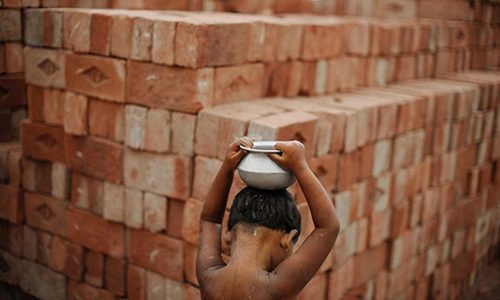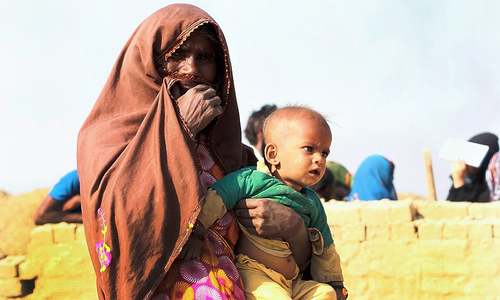KARACHI: Human rights activists, academics and journalists at the launch of 9th report on “The State of Peasants’ Rights in Sindh, for 2023” have called for amending and implementing the Sindh Tenancy Act for the protection of peasants’ rights in the province.
Addressing at the launching ceremony of the report, which is prepared by the Hari Welfare Association, at the Karachi Press Club on Tuesday, the speakers voiced their deep concern over the persistent and widespread practice of debt bondage despite the enactment of the Sindh Bonded Labour Abolition Act of 2015.
They said the District Vigilance Committees (DVCs), established under the Act in every district, had failed to play any significant role in rescuing, protecting, and rehabilitating bonded labourers.
‘State of Peasants’ Rights in Sindh 2023’ launched
Their lack of effectiveness remains a pressing issue, said the rights activists and academics.
Member of National Commission for Human Rights Anis Harion paid tributes to Hari leader Haider Bux Jatoi and others and said that peasants in Sindh still suffer due to influential landlords.
Chairman of the Sindh Human Rights Commission (SHRC) Iqbal Detho said that the SHRC had taken up workers’ issues, including the implementation of the minimum wages law.
Akram Ali Khaskheli, president of the Hari Welfare Association, said that in 2023, the data gathered by their association indicated that 542 peasants, including 185 children, 178 women, and 179 men, were liberated from bonded labour in the agriculture sector.
Additionally, between 2013 and 2023, a total of 12,116 bonded labourers were freed from the clutches of landlords in Sindh, including 4,134 children and 4,037 women.
Mr Khaskheli criticised the Sindh government for its ‘anti-peasant stance’, particularly its refusal to withdraw an appeal filed in the Supreme Court of Pakistan against a pivotal ruling by the Sindh High Court (SHC) in October 2019. This appeal challenges the nullification of regressive amendments to tenancy laws and the issues surrounding bonded labour, reflecting the government’s “support for the entrenched feudal and tribal systems that hinder the establishment of a just legal framework for peasants”, he added.
He said the Sindh Women Agriculture Workers Act of 2019, despite receiving international recognition, had not been implemented even after five years of passage as no women’s groups had been formed under this law.
Additionally, the Sindh Industrial Relations Act (SIRA) of 2015, which acknowledges peasants as workers and grants them the right to form unions, has not had its Rules of Business officially notified.
This lack of clarity in defining the rights and scope of agricultural workers further complicates the legal landscape, he added.
Mr Khaskheli also noted that the recently approved Sindh Water Policy (SWP), which aims to manage water resources effectively, faced implementation challenges due to “bureaucratic inertia and inadequate funding”.
“These challenges threaten to undermine its effectiveness, particularly for peasants and rural workers.”
The report highlights that the Sindh government pledged to introduce ‘Hari Cards’ for underprivileged peasants with a subsidy of Rs3 billion. However, the HWA expressed concerns about the lack of groundwork, inadequate documentation, and the exclusion of landless sharecropping peasants from this programme.
Salient features
The ‘State of the Peasants’ Rights’ report shared with the media on this occasion noted that on November 2, 2023, the Sindh Labour and Human Resource Department announced a minimum wage of Rs32,000 per month for unskilled workers. However, this wage remains unimplemented in rural areas, where daily wages for male workers is around Rs700, with female workers earning even less, the report says.
The report has recommended that the Sindh government must immediately withdraw its appeal against the Sindh High Court’s 2019 ruling to demonstrate support for progressive tenancy laws and the eradication of bonded labour, in alignment with the Constitution of Pakistan and international agreements.
The Sindh Tenancy Act (STA) provisions, particularly the requirement for written tenancy agreements, must be actively enforced to prevent disputes and protect peasants’ rights.
The Sindh Resettlement and Rehabilitation Policy (2022) should also be amended to include specific measures for land redistribution and livelihood restoration for landless peasants, especially those affected by natural disasters.
Furthermore, the government should allocate necessary funding and provide technical assistance to activate and enhance the effectiveness of DVCs across Sindh and ensure that the Rules of Business for the Sindh Bonded Labour Abolition Act are framed in consultation with civil society organisations and published in the gazette as soon as possible.
The HWA also demanded that the government implement strict measures to prevent forced evictions, the demolition of huts, and the seizure of livestock, ensuring that any eviction processes respect the rights and dignity of the affected families.
Published in Dawn, August 28th, 2024















































Dear visitor, the comments section is undergoing an overhaul and will return soon.